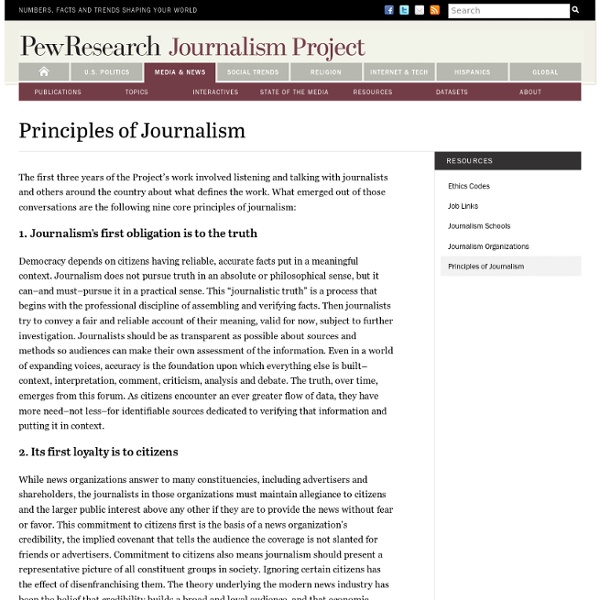He Said, She Said, and the Truth
But while balance may be necessary to mediating a dispute between teenage siblings, a different kind of balance — some call it “false equivalency” — has come under increasing fire. The firing squad is the public: readers and viewers who rely on accurate news reporting to make them informed citizens. Simply put, false balance is the journalistic practice of giving equal weight to both sides of a story, regardless of an established truth on one side. And many people are fed up with it.
Chapter 57: Fairness
In this chapter, we discuss the reasons for fairness in reporting. We advise on ways of maintaining fairness throughout news gathering and news writing. We discuss the need for special care in writing comment columns, in campaigning journalism and in reporting elections and court cases. There are three basic qualities which should guide the work of a good journalist - it must be fast, fair and accurate: Speed comes from increasing knowledge, confidence and experience.
Objectivity and Fairness - Objectivity and fairness in news stories
You hear it all the time – reporters should be objective and fair. Some news organizations even use these terms in their slogans, claimed that they are more “fair and balanced” than their competitors. But what is objectivity, and what does it mean to be fair and balanced? Objectivity
WikiLeaks and the Myth of Objective Journalism « MooreThink.com
“Journalism can never be silent: that is its greatest virtue and its greatest fault. It must speak, and speak immediately, while the echoes of wonder, the claims of triumph and the signs of horror are still in the air.” – Henry Anatole Grunwald There is a very simple reason WikiLeaks has sent a furious storm of outrage across the globe and it has very little to do with diplomatic impropriety. It is this: The public is uninformed because of inadequate journalism. Consumers of information have little more to digest than Kim Kardashian’s latest paramour or the size of Mark Zuckerberg’s jet. Very few publishers or broadcasters post reporters to foreign datelines and give them time to develop relationships that lead to information.
The Myth of Objectivity in Journalism
by This page has been accessed since 29 May 1996. The oft-stated and highly desired goal of modern journalism is objectivity, the detached and unprejudiced gathering and dissemination of news and information.
BeginnersGuide/NonProgrammers
Python for Non-Programmers If you've never programmed before, the tutorials on this page are recommended for you; they don't assume that you have previous experience. If you have programming experience, also check out the BeginnersGuide/Programmers page. Books Each of these books can be purchased online but is also available as free textual, website, or video content.
Objectivity (journalism)
Journalistic objectivity is a significant principle of journalistic professionalism. Journalistic objectivity can refer to fairness, disinterestedness, factuality, and nonpartisanship, but most often encompasses all of these qualities. Definitions[edit]
Rethinking Objective Journalism
July 8, 2003 | Like this article? Join our email list: Stay up to date with the latest headlines via email. In his Mar. 6 press conference, in which he laid out his reasons for the coming war, President Bush mentioned al Qaeda or the attacks of Sept. 11 fourteen times in fifty-two minutes. No one challenged him on it, despite the fact that the CIA had questioned the Iraq-al Qaeda connection, and that there has never been solid evidence marshaled to support the idea that Iraq was involved in the attacks of 9/11.
Social Media in Journalism: Is Transparency the New Objectivity?
In recent months (and years) a number of media outlets and even wire services have made industry headlines for revamping or addressing staff member’s use of social media. The New York Times, Reuters, and the Washington Post are on the list. More recently the Toronto Star undertook a similar revamp of their newsroom Policy and Journalistic Procedures. Rather than delve into the details, Mathew Ingram with GigaOM had an insightful look at how many media companies miss the keyword in social media – social – using the Star’s play book as an example. And then on the other end of the spectrum there is Patch.com.



